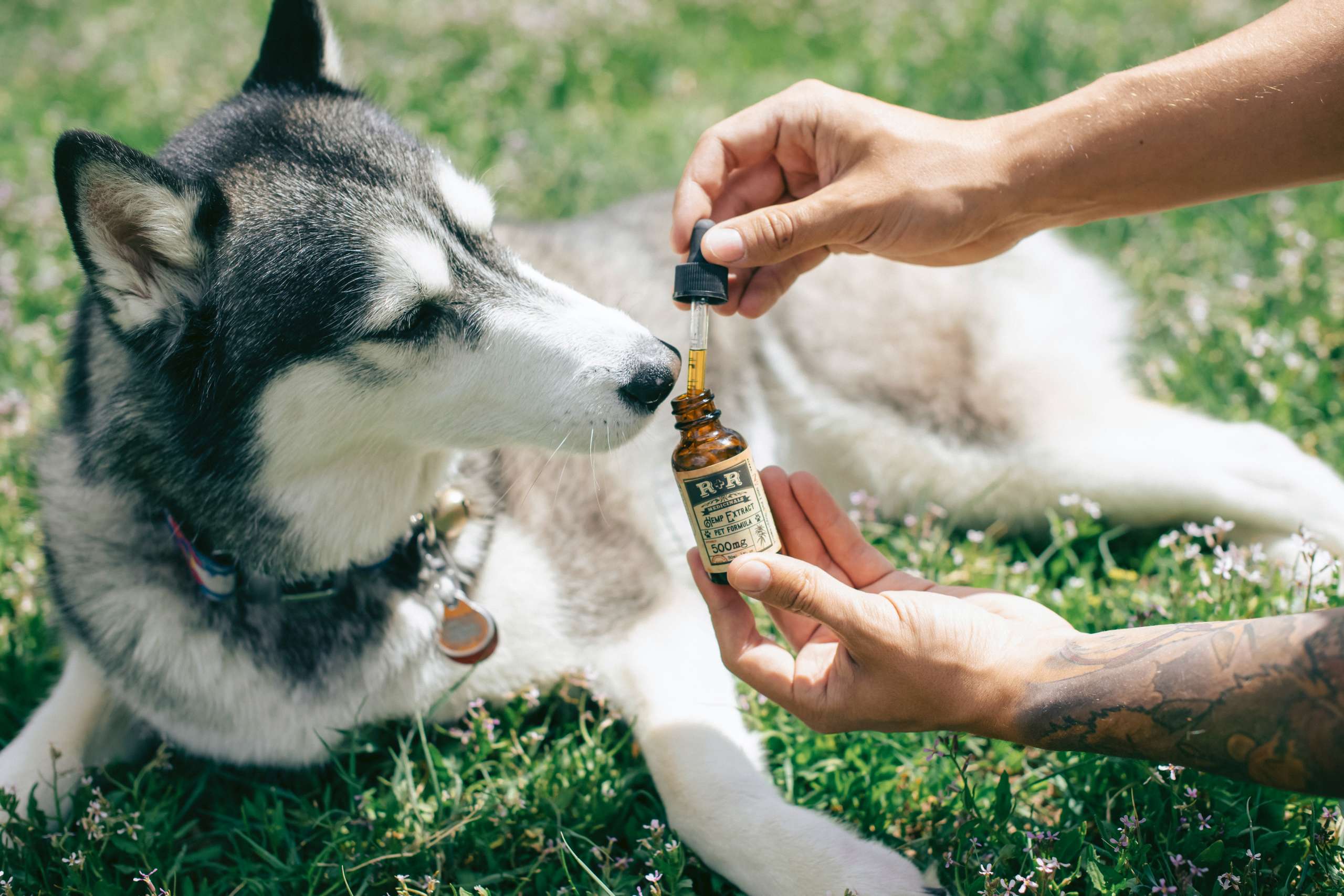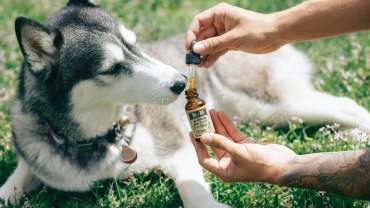


More and more dog owners are turning to CBD as clinical evidence supports its use. There are a variety of ways you can use this powerful, yet gentle herbal to naturally treat ailments in both humans and pets. In fact, CBD is clinically proven both safe and effective and is endorsed by medical professionals across the globe.
According to studies and anecdotal evidence, CBD has been found to be helpful in treating conditions such as arthritis, pain, cancer, and anxiety. Pet owners are becoming increasingly curious as CBD pet products are marketed as a natural form of treatment for these conditions in dogs.
What Exactly is CBD? Is It a Narcotic?



CBD is not a narcotic and is legal in most states here in the US. Because of the unique extraction methods, your pet can enjoy all the calming benefits of CBD without any unwanted side effects you might expect with traditional cannabis.
Cannabidiol, more commonly known as CBD, is a compound found in Cannabis and Hemp. Cannabinoids are naturally found in the Cannabis plant and are considered a class of chemical compounds. CBD positively interacts with the endocannabinoid system, which helps the maintenance of the body’s overall wellness.
CBD shares important metabolic pathways with NSAIDs (non-steroidal anti-inflammatory drugs) like ibuprofen. These pathways control inflammatory responses and blood clotting, among other things. Unlike it’s cousin THS, (delta-9-tetrahydrocannabinol) – CBD doesn’t make one “high“, but it’s still considered a psychoactive treatment.
Is CBD Safe for Your Dog?
The safety and risks of using CBD for dogs have not been formally researched yet. Any medication or supplement carries a risk of a reaction. As a rule, it’s a good idea to start with small amounts when giving your dog something new and monitor the effects closely.
Without formal scientific data on the side effects of CBD usage for dogs, the possible side effects based on how CBD affects humans include:
- Dry mouth
- Lowered blood pressure
- Drowsiness
- Increased appitite
If any of these effects occur with your dog they will resolve on their own with time, similar to humans. Many people are turning to CBD as a way of treating anemia in dogs thanks to an increase in appetite.
Anecdotal evidence and studies relying on patient and family reports show that life-threatening risks for dogs from Cannabis are nonexistent. There is no documented lethal dose for THC or CBD in dogs. Although veterinarians are not able to prescribe CBD-related products, they may be able to discuss the benefits and risks as they relate to your dog specifically.
Is CBD Legal for Pets?



It is legal to sell hemp-derived products containing less than 0.3 percent THC for human consumption. But up until recently, the American Veterinary Medical Association did not approve of veterinarians suggesting any cannabis-derived products (including CBD). Although CBD products aren’t approved by the FDA for dogs, neither are other common supplements for dogs including glucosamine and fish oil.
You may discover many veterinarians are reluctant to suggest CBD without a prompt from you. This is possibly due to the lack of scientific evidence or fear of professional repercussions. However, once you bring it up, many are happy to discuss CBD with you with the main concern being interaction with other supplements or prescribed drugs.
Why Give Your Dog CBD?
It’s often mentioned that CBD is a useful therapy for a variety of conditions, including seizures, arthritis, pain management, anxiety, and cancer. Although the use of CBD in the treatment of these conditions is not researched enough, there are varying levels of scientific evidence in each case. CBD can potentially be a beneficial natural alternative to harsh prescription medications.
What Health Problems Can CBD Oil Address?



Relying mostly on anecdotal evidence from dog owners, CBD has been shown to help treat the following in dogs:
- Arthritis
- Neuropathic pain
- Seizures
- Cancer
- Anxiety
- Low appetite
- Nausea
- Anti-inflamatory effects
- Cardiac benefits
How Do I Know if My Pet Has Anxiety?
If your pet has been peeing inside the house, chewing up things, and barking uncontrollably, and otherwise acting out – this indicates anxiety. The good news is, CBD has anti-anxiety properties which may also benefit your pet.
How to Choose CBD Products for Your Dog
There are literally hundreds of CBD products on the market and very little regulation of them, which makes finding one for your dog a bit overwhelming. Below are a few things to look for when choosing a CBD product for your dog.
- Avoid edible products formulated for human consumption, which often contain ingredients that are toxic to pets (i.e. xylitol).
- Choose full-spectrum products, which include all cannabinoids and terpenes found in the Cannabis plant. CBD works best in conjunction with these rather than as CBD isolate.
- Avoid products that contain pesticides, fungicides, additives, or solvents.
- Get the Certificate of Analysis (COA), which certifies exactly what ingredients the product contains as well as the percentages of each cannabinoid.
- Stick to CBD as a liquid. This is the best form to administer CBD because you can adjust the dose drop by drop.
Once you find the right product for your pup, work up gradually to the dosage suggested on the label. More is not always better, but you will be able to see behavioral changes and improvements in the health of your dog.



How to Give Your Dog CBD
Dogs can be given CBD in many forms, including treats, creams, and oils. In 2018, one Colorado State University made a study on giving CBD to dogs with epilepsy. The results showed that it was more effective to give dogs CBD oil orally, rather than a gel capsule or cream. However, before any conclusions can be made, more research needs to be done.
How Much CBD to Give to Your Dog?
A good rule of thumb for both dogs and cats is to start with 1-2mg of CBD for every 10 pounds of your pet’s weight. Start by giving them CBD once daily, and slowly increase to twice daily. If you’re using CBD oil, remember that they have different concentrations. Essentially, the amount on the label is the total amount of CBD in the entire bottle- not the per-dose amount.
Key Takeaways: Is CBD Right for Your Dog?
Bottom line? It’s important to realize that research on CBD and pets is sparse. Plus, CBD isn’t regulated yet by the FDA, so if products are labeled inaccurately, there may be safety issues. Also, there isn’t anything super alarming about CBD. Otherwise, preliminary studies and anecdotal evidence suggest that CBD may be beneficial in the treatment of certain conditions in pets.
So, if you’re looking for a more natural way to optimize your dog’s health, CBD could be the right route to take. However, if your pet is facing real concerns that worsen with time, it’s probably a good idea to head to the vet. We hope this article has helped you understand the pros and cons of CBD for your dog!
Emily is a writer who travels full-time in a converted school bus (aka skoolie) with her 5 year old lab mix, Eliot. She is passionate about sustainability and making healthy lifestyle changes. Emily enjoys hiking and exploring the country with Eliot.
